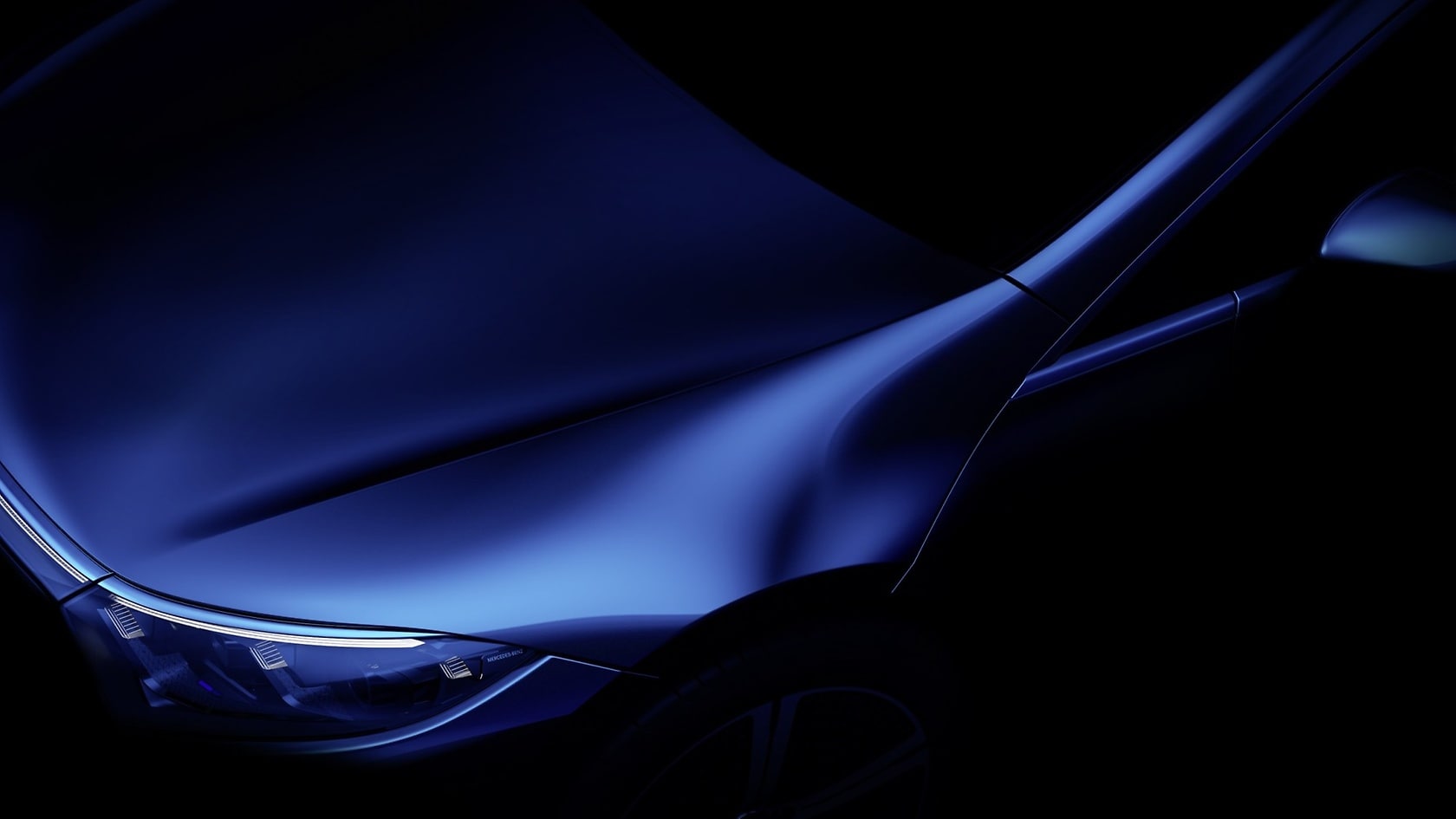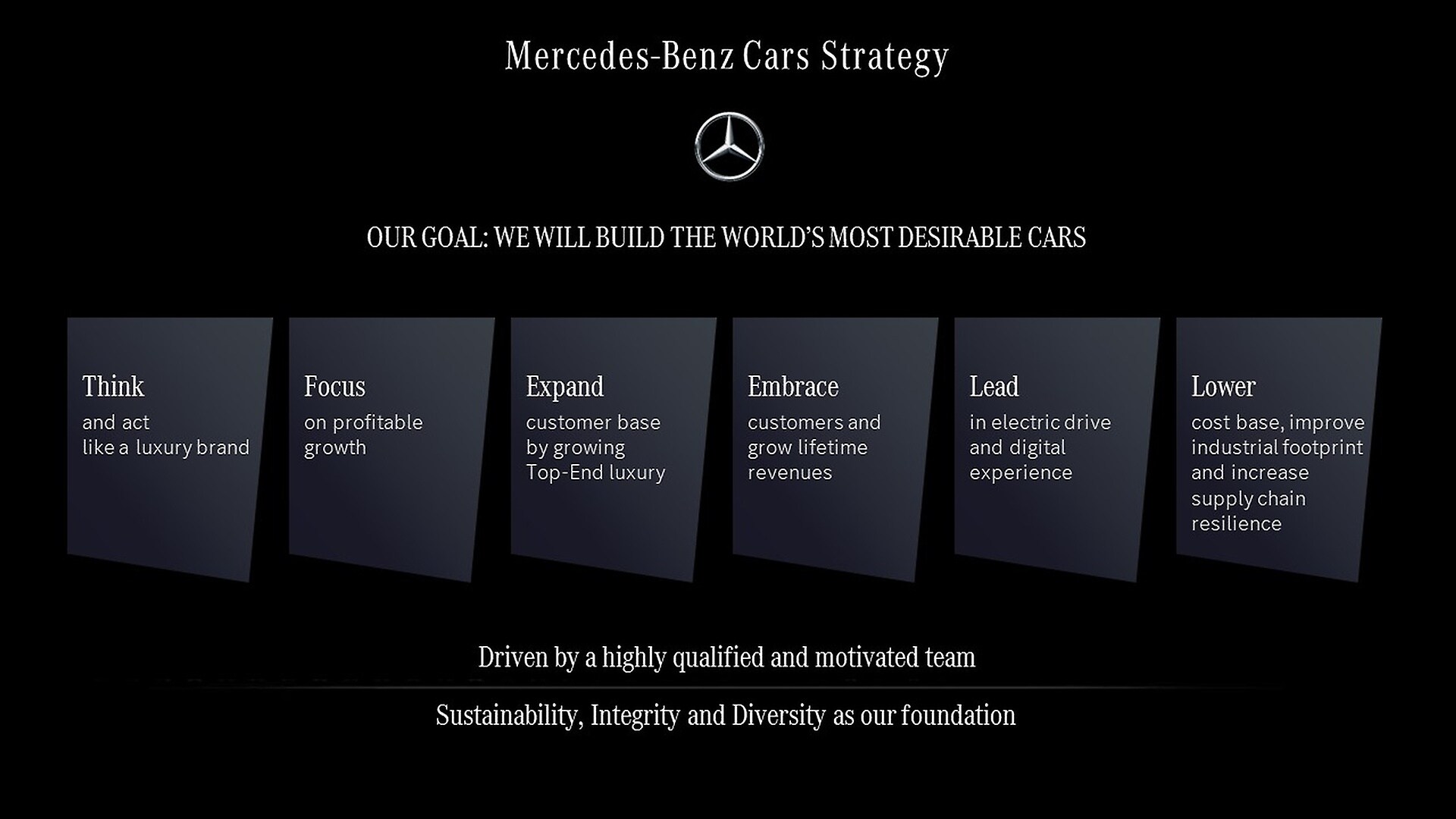As a pioneer in automobile manufacturing, the Mercedes-Benz Group has set itself the objective of shaping the future of mobility in a safe and sustainable manner.
In doing so, the company focuses on innovative and forward-looking technologies and safe high-quality vehicles that fascinate and excite. The Mercedes-Benz Group comprises the automotive business units Mercedes-Benz Cars and Mercedes-Benz Vans as well as Mercedes-Benz Mobility. Each business unit pursues a strategy that is specifically targeted at the market and customers it serves. The strategy in question is based on the principles of sustainability, integrity and diversity and is supported by a highly qualified and motivated team.
Our Goal: We will build the world’s most desirable cars
Eight facts you should know about our Mercedes-Benz strategy
- The combination of brand strength and cutting-edge technology made us successful from the start. For more than 130 years we have built products for the world's most demanding customers.
- With sales of approximately 300,000 Top-End vehicles per year, Mercedes-Benz today is the world market leader in this segment. Innovations such as the world’s first certified level 3 automated driving system prove that we remain innovation leaders.
- Our financial strength is the foundation of our power to innovate. We invest €7 billion per year in research and development.
- Our focus is on growth in the segments that promise high and stable returns: Top-End and Core.
- Forecasts show that the number of wealthy customers will continue to rise worldwide in the long term. This will increase our sales opportunities for Core and Top-End vehicles – that applies to Asia, Europe and the U.S.
- Studies show that luxury brands are more resilient to crises and are able to recover more quickly from economic downturns. This is how we protect our company and jobs, even in challenging times.
- We are elevating the technological substance in the Entry segment. At the same time, we are reducing the variants and thus the complexity. We are going from seven compact models today to four in the future.
- We are not reducing our sales volume in our entry-level segment. Plant capacity utilization therefore remains unchanged, as does the indispensable role of plants such as Rastatt, Kecskemét and Beijing.
- Based on the new MMA platform, our future Entry models will be true drivers of innovation. We will prove that by introducing our MB.OS operating system mid-decade in the Entry segment.
- Luxury and sustainability belong together. Demanding customers in particular want to be pioneers in this area. We follow an ambitious decarbonization strategy.
- For us the solution does not lie in doing without, but in technological progress. We are working on bringing green steel into our vehicles; not just purchasing green electricity, but producing it ourselves; minimizing the use of raw materials such as cobalt; and maximizing the energy density of our batteries by, for example, developing solid-state batteries.
- Our VISION EQXX underscores this strategic course. With this concept vehicle, we have taken the efficiency of electric vehicles to a whole new level. Under real-world conditions it covered more than 1,200 kilometers (almost 750 miles) on a single battery charge.
- Price pressure in the volume segment is high. We cannot and do not want to compete in a price war regarding our cost structures. (This is particularly true in Germany, where wages are high. In our home market sales account for approximately 10 percent of overall sales, but employ almost 69 percent of our workforce.)
- We also cannot win a price war during the transformation towards e-mobility: The drive for an electric car costs several thousand euros more than a comparable combustion engine. This is mainly due to the high cost of the battery. We can probably reduce this gap in the next few years, but not close it.
- We are focusing on what has always distinguished Mercedes-Benz: high-quality products with that special something. This way, we can also handle the extensive investments in electrification and digitalization.
- Our technical innovations have never been reserved solely for elite circles, although they are initially financed by them. We first installed airbags, ESP and ABS in the S-Class – today they are standard equipment in all vehicle segments.
- Mercedes-Benz will continue to stand for technological progress in the future.
- With the help of our pioneering work and with the ingenuity of our engineers, we will make road traffic even safer, more comfortable and more sustainable.
- We are responsible for approximately 166,000 colleagues from 142 nations – and for hundreds of thousands of other people in indirect employment, such as those who work for our more than 40.000 direct suppliers and partners.
- We clearly claim that respecting human and employee rights is not just something that is demanded from us, but also something we demand from our suppliers and partners.
- We have a strong commitment to education and training. As part of our Turn2Learn initiative, by 2030 we will invest more than €2 billion worldwide in the qualifications and further training of our employees.
- With the proceeds from the auction of the Mercedes-Benz 300 SLR Uhlenhaut coupé, we have set up a global fellowship program, which will provide research and project scholarships for young people in the areas of environmental sustainability and decarbonization.
- There are many expectations towards Mercedes-Benz: Our customers expect top products. Our colleagues expect future-proof jobs. Our shareholders expect an appropriate return on their investment. Society expects our commitment to extend beyond our factory gates.
- All of these claims are legitimate. The best way to deliver on them is to make our proud company economically successful – sustainable and profitable.
This page was last updated in April 2024.

